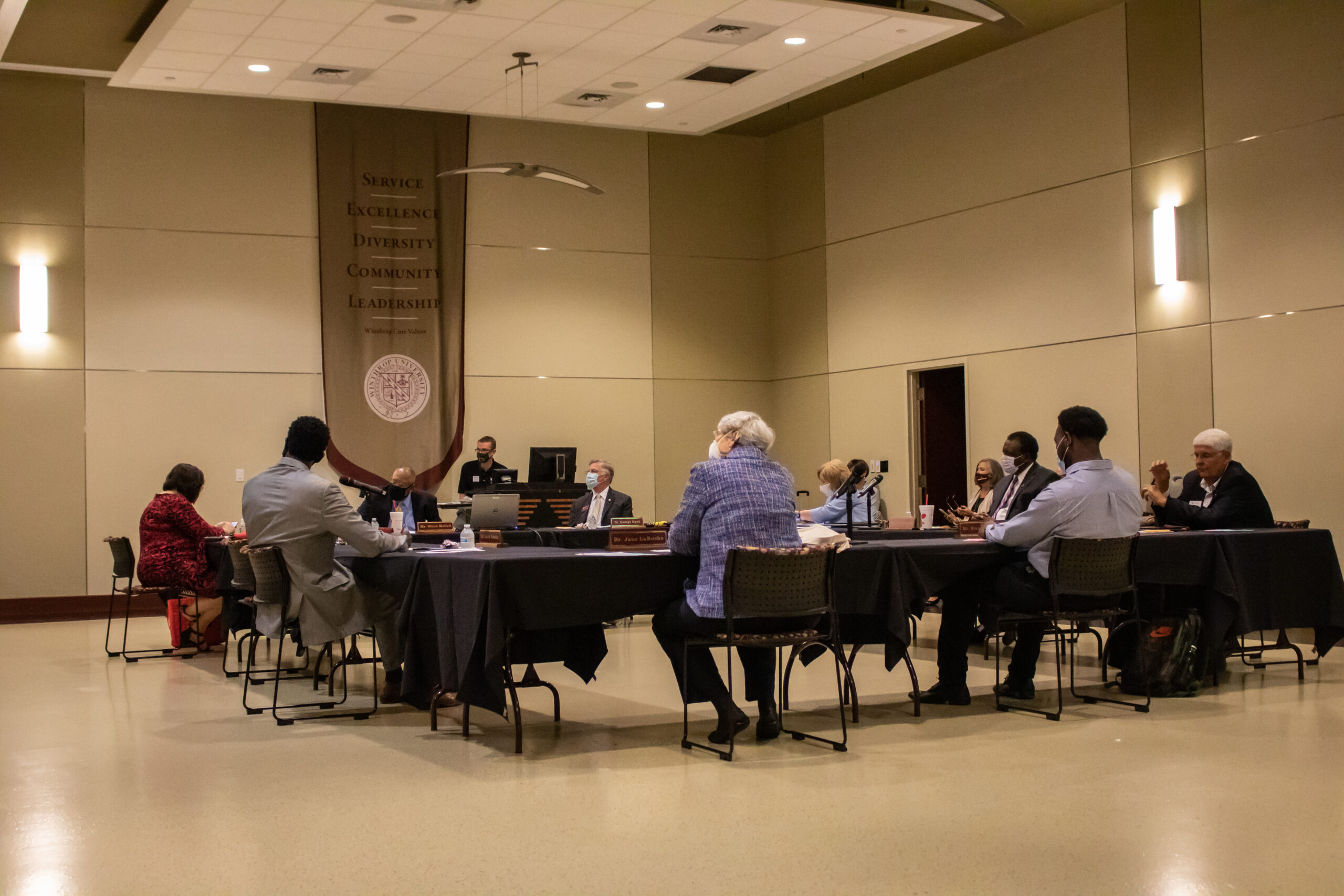The Board of Trustees has unanimously voted to close an ethics complaint against four individuals involved in the decision to eliminate the Winthrop Tennis program, including the chair and vice chair of the board.
The complaint levied ethical grievances against the Vice President for Intercollegiate Athletics Ken Halpin, Interim President George Hynd, Board Chair Glenn McCall and Vice-Chair Kathy Bigham for their individual actions surrounding the elimination of the Winthrop tennis program in June 2020. The complaint also included several attached emails and a “list of people who have witnessed this unethical behavior and corruption,” says the letter.
The document, issued to the South Carolina State Ethics Commission, alleged “unethical behavior and corruption that I never thought possible…,” said the complainant, who asked to be kept anonymous.
“I am absolutely sickened by what has happened, and what continues to happen, to cover up the most extreme unethical behavior,” said the complainant. “I am saddened that University and Board leadership is showing extreme ill will against me, a whistleblower, for alerting them to unethical behavior. I do care about the future of my university and it all starts with leadership and ensuring that ethics are the highest priority… as it should be with any institution of higher education.”
The complaint alleged Halpin of stating grossly false budget information to the Board of Trustees in the board meeting prior to their decision to eliminate the tennis program, not providing any documentation to back his figures, as well as failing to inform the board that he had until December to make cuts. It additionally alleges that Halpin purposefully withheld information related to a major donor that would support tennis court renovations, and confirmed that he circumvented the boards authority by notifying all tennis team members and coaches of their certain elimination before the board met. That notification to the teams happened prior to the board being notified that a team cut was possible, but also before the Athletics committee meeting the day before the board meeting. Other allegations include the exclusion of a key Athletics Committee member and key member of finance from knowing about the cut, both of whom only found out after it happened.
The complaint alleged McCall of violating the South Carolina Freedom of Information Act by “hosting the majority of the Board Meetings in Executive Session, whether or not certain topics qualify for Executive Session.”
The Freedom of Information Act states that “public business be performed in an open and public manner so that citizens shall be advised of the performance of public officials and of the decisions that are reached in public activity and in the formulation of public policy. Toward this end, provisions of this chapter must be construed so as to make it possible for citizens, or their representatives, to learn and report fully the activities of their public officials at a minimum cost or delay to the persons seeking access to public documents or meetings.
The complaint alleged that the Board’s decision to eliminate the tennis program in the executive session, amongst other decisions, violated this act.
The complaint alleged that Bigham withheld information related to a Conflict of Interest due to her financial donations towards the men’s basketball program and her close relationship to the current men’s head basketball coach, and therefore had a vested interest in in ensuring one sport’s would not receive even minor cuts at the peril of another. The complaint also alleged that Bigham was “instrumental in ensuring the voices of five distinguished tennis alumni were silenced by not allowing them to participate in the public session before the September Board of Trustees meeting.”
The complaint alleged Hynd of libeling against the complainant and eluding responses regarding investigations into Halpin’s conduct related to the tennis program’s elimination. The Board said that there was “no evidence to substantiate any of the allegations” brought forth by the complaints against the four individuals at the Feb. 19-20 retreat. The motion to close the complaint was voted on without any discussion from Board members during the public session of the meeting. McCall and Bigham recused themselves from voting on the motion.
General Counselor for Winthrop University Caroline Overcash said that this is a typical procedure for any behavior-related complaint that reaches the board.
“The theory of Executive Session is designed so that public bodies can talk about things in an open way and they can have an open debate, so you would want to remove anything that would taint them,” Overcash said. “If they had a complaint against one of us [a Winthrop employee], they would discuss that in Executive Session and come out and say ‘We don’t find any merit, so we’re gonna close it,’ or decide ‘Hey, we think you did something wrong, so we’re gonna refer that over for further investigation,’ based on the evidence.”
The complainant said that they don’t believe the complaint was properly examined, and that instead a neutral third-party investigator should’ve been assigned to review the incident and it’s evidence.
“There are conflicts of interest with some Board members, but the bigger conflict involved those who are associated with the named respondents who were in charge of the so-called investigation and collection of evidence, which did not occur. I asked Ms. Overcash back in September if in her history of working with the Board if a Board member ever recused themselves from participating in discussion and voting due to a Conflict of Interest. I also asked her what kind of training/orientation new Board members receive. Because I did not get a response on either front, I assume none on both. When it came to tennis, there was another Board member who had a gross conflict of interest in that decision & that person was a committee chair, yet he was not named in the complaint. At this point, it’s all about covering up what happened and protecting those involved. I can tell you that there consistently seems to be a great deal of vital information being withheld from the majority of the Board by Board and University leaders. How can a board make a decision on insufficient information or when they only hear one narrative?,” the complainant said.
“I serve on the executive board of a global non-profit in NYC and if any type of allegation of this nature is brought upon leaders of the board and/or our administration, there is only one course of proper action. That is to have the insurance carrier assign a neutral third-party investigator to fully investigate the claims and formulate an official report. Not only were respondents copied on emails to the complainant by the Human Resources representative but officials who were fully involved in the conduct, even though they were not named in the complaint, were involved in assessing the claim. Of course, you would think that the complainant would be thoroughly vetted and all of their evidence examined, but that didn’t happen. The lack of professionalism and seriousness for which claims are handled worries me for staff and students,” the complainant said.
Photo by Olivia Esselman




